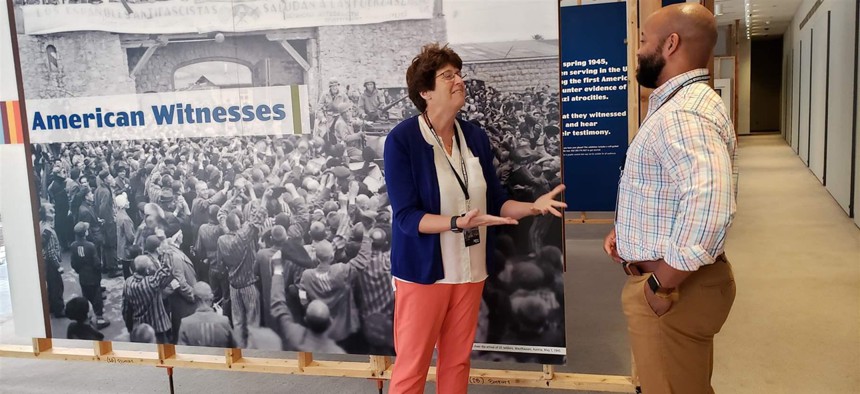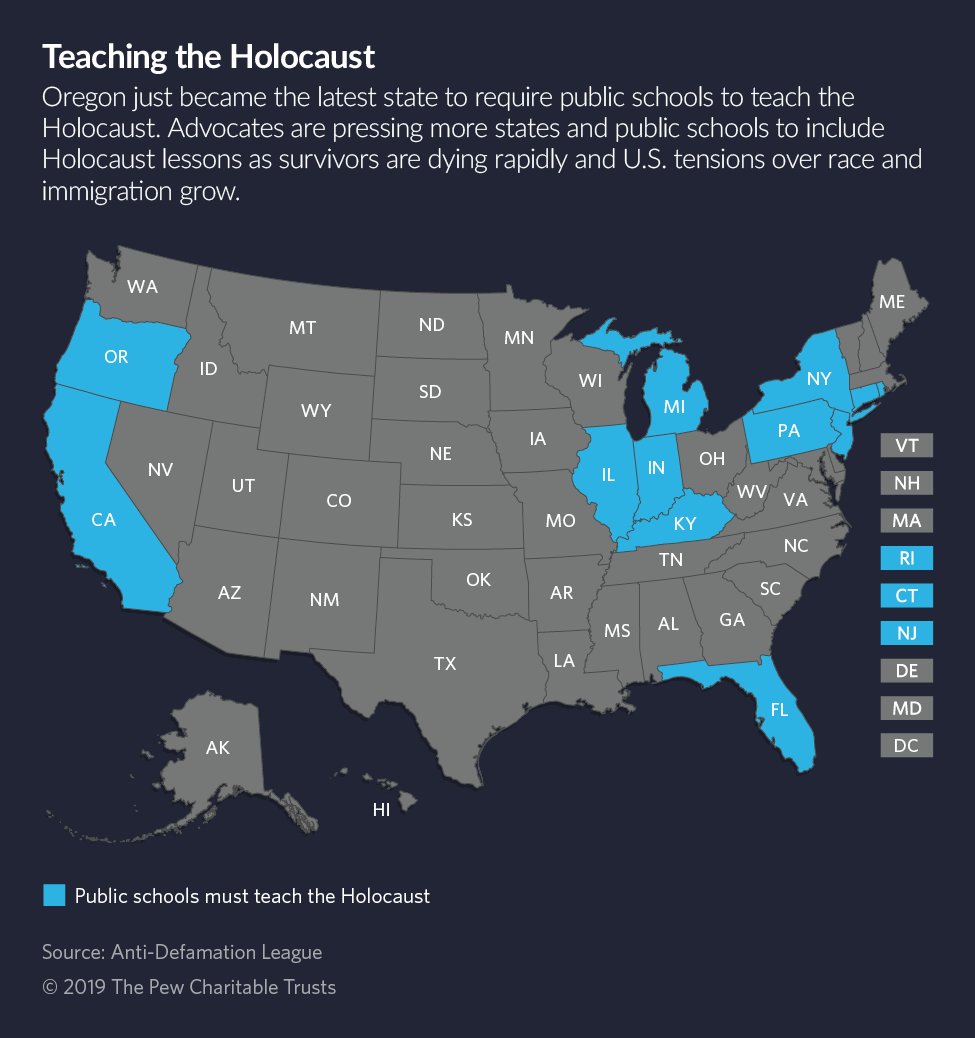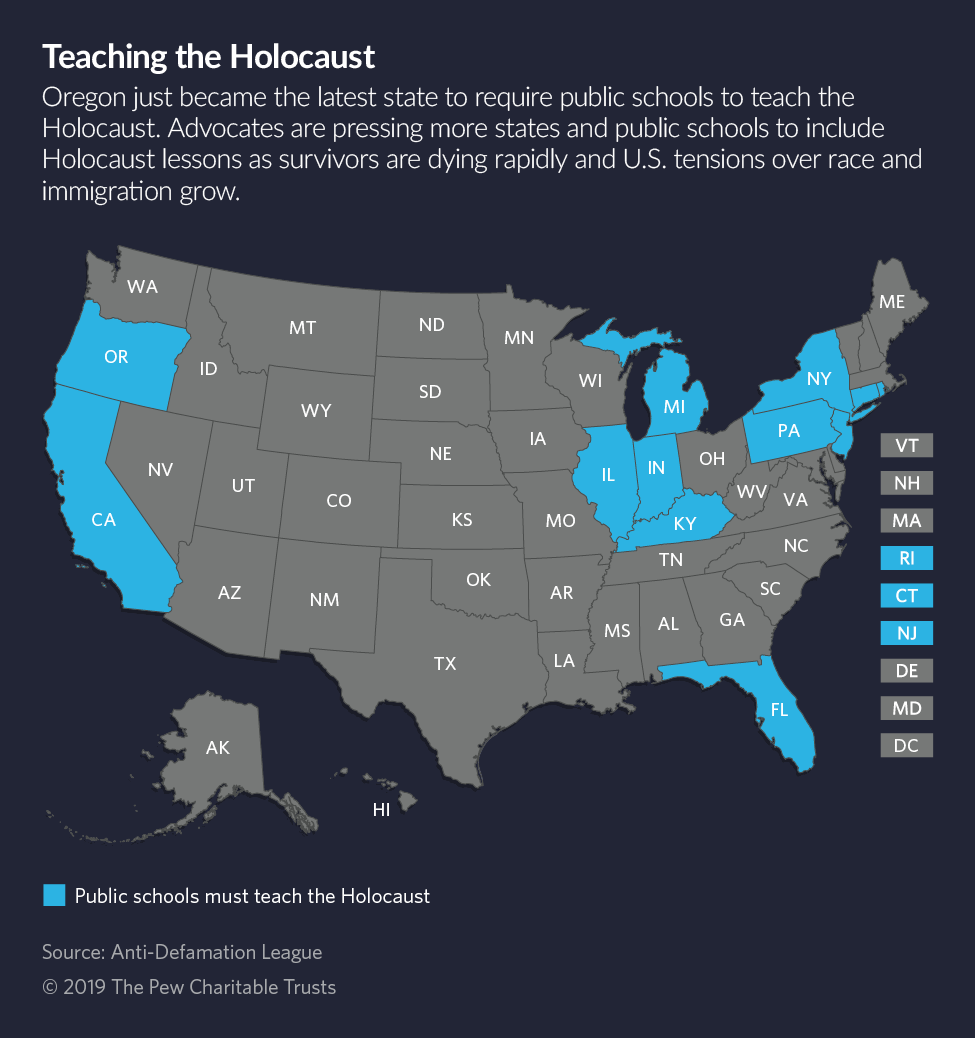As Hate Incidents Rise, States Require Teaching the Holocaust

Kim Kenneson of Johnson City, Tennessee, and Nicholas Turner of Zachary, Louisiana, at the U.S. Holocaust Memorial Museum in Washington, D.C. The teachers discuss teaching the Holocaust in front of a mural about the American reaction to the Holocaust. Pew Charitable Trusts
How does hate today relate to the Holocaust? Students in many states can learn.
This article originally appeared on Stateline, an initiative of the Pew Charitable Trusts.
WASHINGTON, D.C. — Claire Sarnowski of Lake Oswego, Oregon, met Holocaust survivor Alter Wiener at a school event five years ago when she was 9 years old.
Because her aunt had arranged the talk by the Holocaust survivor, and served as his escort to the school and back, Sarnowski got to ride along when Wiener was driven home. The two started talking and formed an immediate bond. They kept in touch, with Sarnowski often persuading someone to drive her to see Wiener at his home in Hillsboro, Oregon, about an hour away from where he spoke. They shared meals and stories. Sarnowski became increasingly interested in Wiener’s tales of living under Hitler during World War II and his life since then.
She thought other kids should learn about them too and began a campaign to get a state law requiring Holocaust education in Oregon schools. Last month, Democratic Gov. Kate Brown signed that law, with Sarnowski, now age 14, looking on. Even though Wiener died late last year at 92, Oregon students will continue to learn the lessons he shared.
Oregon is the 12th state to enact such a law, according to the Anti-Defamation League. Most of the states have acted in the past few years, and bills are pending in another dozen states.


In a telephone interview, Sarnowski said it’s very hard for young people to relate to the Holocaust, particularly in that there are fewer survivors around for them to talk to. It was the personal talks with Wiener, she said, that made it real for her. Surveys show that Sarnowski’s instinct is on target regarding young people.
Ignorance about the Holocaust is growing, particularly among young people. A survey last year showed that two-thirds of U.S. millennials were not familiar with Auschwitz, the largest Nazi death camp complex, located near Krakow, Poland. More than 1.1 million people were gassed, shot or starved at Auschwitz, including nearly a million Jews. Overall, the Nazis murdered 6 million Jews during the Holocaust, plus millions of Roma, homosexuals and others.
The Holocaust was the largest genocide in history, but not the last one. More recent examples include the Khmer Rouge’s killing of about 2 million Cambodian dissidents between 1975 and 1979; the Hutu slaughter of about 800,000 mostly Tutsis in Rwanda in 1994; and the Sudanese government’s killing of 300,000 civilians in the Darfur region, beginning in 2003.
“For me, being able to hear stories of survivors ... that connection was the most valuable piece of my education,” said Sarnowski, who is not Jewish. “Just to know what happened, what led up to it … and that this is considered our recent history. It’s important to learn for the future and what we can do to make a difference in our own community. How we can stop the persecution of people in our schools for racial, religious [reasons] or just people who are different.”
She forged a special bond with Wiener, who was born in 1926 in Chrzanow, Poland, near the German border. When the Germans invaded Poland in 1939, Wiener, his stepmother and his brothers fled, leaving his father, a grocer, behind to supply Nazi troops with food. When the family returned three months later, their father had been killed. Wiener, then 13, was sent to several concentration camps and was eventually freed by Russian troops in 1945. The rest of his family died.
Wiener moved to what was then Palestine after the war and eventually joined cousins in the United States, according to the Oregon Jewish Museum and Center for Holocaust Education. He moved to Oregon in 2000 and began speaking to student groups, eventually making about a thousand appearances in schools, the museum said.
Sarnowski visited Wiener nearly every week in the last couple of years of his life, she said, hearing his stories over and over and becoming special friends.
When the two approached Oregon state Sen. Rob Wagner, a Democrat, about passing a law, Wagner sensed that feeling too. “That friendship was pretty magical,” he said by telephone from his Lake Oswego home. He said the planned 15-minute meeting lasted 2½ hours and — along with work with Oregon Jewish groups and Holocaust educators — led to the bill that became law.
Wagner also said he was spurred to act by the rise of anti-Semitism in his neighborhood in suburban Portland. “Near a synagogue in my own neighborhood, there were anti-Semitic posters put up on light poles,” he said. “There’s definitely a rise in racism and anti-Semitism in the last couple of years.”
The point was underscored in hearings in the Oregon legislature on the bill. In a House hearing in May, several people presented testimony that denied the Holocaust took place and said the deaths were exaggerated. Salem resident Tom Madison, in his written testimony, said there were “no gas chambers capable of killing humans” and “Soviet propaganda created the Nazi ‘death camp’ myth.”
The testimony got so emotional that Education Committee Chairwoman Margaret Doherty, a Democrat, recessed the hearing to allow members to compose themselves. The bill passed unanimously.
Sondra Perl, director of U.S. programs for the Olga Lengyel Institute for Holocaust Studies and Human Rights in New York City, said most programs on the Holocaust, including her organization’s, stick strictly to historical fact so as “not to give fuel to deniers.”
That institute, the U.S. Holocaust Memorial Museum, the Shoah Holocaust remembrance foundation and other organizations are creating a rich catalogue of survivors’ stories — many on video recordings — to preserve their experiences even after they die. “When they are gone, the eyewitnesses will be gone,” Perl said.
The Anti-Defamation League, which keeps tabs on hate crimes nationwide, and — along with the FBI — statistics on incidents, reported that anti-Semitic acts hit near record levels last year, with a doubling of anti-Semitic assaults, including the deadliest in American history: the shooting at the Tree of Life synagogue in Pittsburgh, Pennsylvania, in which 11 died.
The overall number of anti-Semitic incidents last year, nearly 1,900, was a slight decline from the nearly 2,000 reported in 2017. But it was still nearly half again as high as the number reported in 2016 and nearly twice as high as in 2015.
Michael Lieberman, Washington counsel for the ADL, said the purpose of the mandated Holocaust education courses should be as much about looking forward as looking back.
“If you can craft them in an age-appropriate way, it’s a study of democracy and the teaching of core values … and how anti-Semitism and racism can run amok even in a democratic country,” Lieberman said. “These are lessons that are not just looking back, but also looking forward.”
The relevance of such lessons was driven home earlier this month, when a high school principal in Palm Beach County, Florida, was removed from his post after the release of emails in which he refused to state that the Holocaust was a historical fact. Spanish River High School Principal William Latson was sacked following reports that he told a parent that “not everyone believes the Holocaust happened” and that he couldn’t say that it was a “factual, historical event,” the Palm Beach Post reported.
This, despite the fact that Florida is one of the states that require public schools to teach the Holocaust. The state laws vary widely — some provide funds or suggest curricula, others do not. Some specify when or how the lessons should be incorporated into courses, while others are less prescriptive.
The Illinois law is one of the most specific, saying that every public school “shall include in its curriculum a unit of instruction studying the events of the Nazi atrocities of … the Holocaust.” The Pennsylvania statute, in addition to curriculum guidelines, calls for in-service training for Holocaust teachers.
Nick Haberman, a Pittsburgh high school teacher who attended last week’s course on teaching the Holocaust here at the U.S. Holocaust Memorial Museum in Washington, said while Pennsylvania requires teaching the Holocaust, it doesn’t spell out just how it is to be taught.
“We were very excited to have the mandate, but it was unfunded,” Haberman said, and he called for more teacher participation in the process. He said the Tree of Life shooting spurred local residents to work on more community-based events to “teach the living history of anti-Semitism. The best weapon against anti-Semitism is education.”
The weeklong course here at the museum, called the Museum Teacher Fellowship Program, is designed to train teachers to create outreach projects on the Holocaust in their schools and communities. Most of the teachers attending the program this month already teach the Holocaust to their students and were hoping to expand their understanding and efforts.
An exercise involving looking at pictures taken during World War II was particularly instructive to the teachers who were attending, underscoring how, for example, an ordinary-looking family appearing to enjoy a swimming pool was actually a photo of a Nazi general, his wife and kids, taken just outside the boundary of a concentration camp where he worked to slaughter thousands.
“It just shows how our perceptions can be wrong,” said Kelsey Cansler, who teaches sixth and seventh grade in Townsend, Tennessee.
Lisa Clarke, who has been teaching middle school units on the Holocaust in Maryland for 16 years, said her students can relate to exclusionary laws, like those aimed at Jews in Germany in the 1930s, because “middle schoolers are all about who’s in the club and who’s not in the club.”
“I’d never say that ‘the Holocaust is just like middle school’ but I want them to get the sense that it is human,” Clarke said. “Part of the things that happened in the Holocaust are human nature. We want to be part of a group … even if that goes against our values and morals.”
Many of the units on the Holocaust talk about the difference between “bystanders and upstanders,” and how students may respond either way to bullying, for example.
Massachusetts state Rep. Jeffrey Roy, a Democrat who represents the near-western suburbs of Boston, is sponsoring a bill in his state that would require Holocaust education, despite the fact that the topic already is included in the state’s education “framework” that forms the basis for instruction in many of the state’s schools.
“The frameworks are voluntary, local school committees have the option to adopt the frameworks as much or as little as they want,” he said. “The legislation would require them to incorporate it into the curriculum.”
Roy said he did not know how many of the 351 local school districts in the state teach the Holocaust, but he suspects it’s a pretty large number.
“No child should graduate from a high school in Massachusetts without being exposed to this type of curriculum,” he said, noting that the ADL reported a more than 90% increase in hate crimes in Massachusetts from 2016 to 2017.
James Waller, a professor of Holocaust and genocide studies at Keene State College in New Hampshire who taught a session at last week’s seminar for teachers here at the Holocaust museum, said there is merit to teaching in “ways that connect the Holocaust and genocide with everyday people … in dehumanizing, ‘other-izing,’ discrimination and so on.”
“I think when teachers are intentional about those connections, I think it can do some good,” he said. “It is when the course is just taught as history that it makes it easy for students to say, ‘It happened then, it happened there, it has no relevance here.’”
Elaine S. Povich is a staff writer for Stateline.
NEXT STORY: Border City Mayors Say Congress Has Not Given Enough Money for Migrant Care





